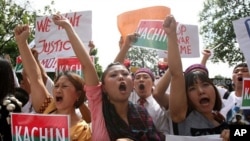Burma's civilian government is surprising skeptics of its commitment to reforms by ordering the military to stop its campaign against armed ethnic groups in eastern border areas. The move follows pressure from the international community to make peace.
Burmese state media carried at statement from the government’s National Human Rights Commission, confirming reports President Thein Sein instructed the military on December 10 to cease its offensive against the Kachin Independence Army (KIA).
The six-month conflict in Kachin state began with a dispute about a joint venture dam project with China on the Dabein River. Burmese troops have been gradually closing in on the KIA headquarters in Laiza.
Despite the ceasefire announcement, KIA officials say fighting continues on the front lines and reinforcement troops are arriving.
"This is welcome," said Henry Hkaung, an advisor to the KIA's chief of staff. "But the problem is although Thein Sein has encouraged the army to stop offensive fighting, military offensives are still going on and mostly increasing the number in all parts of the state. The fighting on the front line is still going on, so the military does not listen to Thein Sein's order."
Kachin state is largely made up of hilly jungle terrain, and the KIA and Burmese soldiers have laid land mines, complicating the prospect of a retreat, which could take weeks or months to complete.
The announcement follows the United Nation’s first mission to the area, where more than 30,000 people have been displaced since the conflict began.
U.N. spokesperson Aye Win said the team hoped to distribute aid to the people fleeing fighting living in temporary camps, but also do a more in-depth assessment of needs.
He stressed his group's programs in Burma remain underfunded.
"This is the first time that a delivery could be made to Laiza and we hope that we will be able to provide further assistance for the delivery as and when it's needed, as the situation calls for, but the situation of stocks and supplies within the country is quite dire right now and we try to mobilize as much as we can to be able to replenish stocks and be able to provide more assistance as is needed," said Aye Win.
The Burmese government has also sent a four-person team of observers to assess the situation. The National Human Rights Commission said it visited people affected by the conflict in government controlled areas, but did not access KIA controlled areas.
"Because this is the only way that can bring about peace and restoration of security and law and order in the region so I think this deserved to be welcomed by the commission and not only that we also strongly urge the KIA to reciprocate the gesture of the president," said Win Mra, head of the NHRC.
Win Mra says the team did not investigate allegations that the Burmese military has committed war crimes or other human-rights abuses.
Outside aid groups that have visited the conflict area in recent months have reported finding evidence of soldiers looting food from civilians, firing indiscriminately into villages and using villagers as human minesweepers and porters.
Win Mra said he had not read the reports, but dismissed the allegations.
"We do not have definite evidence," he said. "There may be pictures. The problem is that normally these allegations are directed in places where fighting is taking place. Normally, the standard allegation is use of rape as a weapon of war, but our mission was mainly concerned with the humanitarian aspect."
Although ceasefire negotiations between the government and the KIA have so far not ended hostilities, other armed ethnic groups along the border including the Shan State Army South and one faction of the Democratic Karen Buddhist Army have recently brokered deals.









